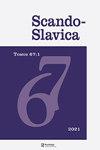The Prehistory of the Proto-Slavic Abstract Suffix *-ostь and its Baltic Congeners
IF 0.2
0 HUMANITIES, MULTIDISCIPLINARY
引用次数: 0
Abstract
ABSTRACT The study deals with the origin of the Proto-Slavic adjective abstract suffix *-ostь. Firstly, the existing proposals are systematized and evaluated. It is concluded that the most promising explanation is the one according to which the suffix *-ostь was metanalyzed from regular abstract nouns in *-ь (*zelenь -i ‘the color green’ ← *zelenъ ‘green’) built to an old class of adjectives in *-ostъ < *-osto-, not directly preserved but paralleled in other Indo-European languages (Latin angustus ‘narrow’). The article proceeds to provide a number of observations corroborating and extending this theory. Evidence for the ‘missing link’, i.e. the class of adjectives in *-ostъ, is sought in Old Polish personal names of the type Miłost and in the inferred basis of derivatives parallel to *-ostь, such as the noun *starosta. Furthermore, the Baltic evidence is engaged seriously: in line with recent research, Lithuanian -astis must be treated as cognate – and not borrowing – of Slavic *-ostь, which impacts the diachronic explanation. It is argued that formations such as Lithuanian abstracts in -asta(s) may reflect traces of a class of adjectives in *-asta- < *-osto- as well. The abstract in *-asti- can be considered as yet another meaningful innovation of Proto-Balto-Slavic.原斯拉夫抽象后缀*-ostă及其波罗的海同源词的史前史
本文研究了原斯拉夫语形容词抽象后缀*- ost*的起源。首先,对现有的方案进行了系统的整理和评价。结论是,最有希望的解释是,后缀*- ostxe从*- xe中的规则抽象名词(* zelenxe -i ' the color green '←* zelenxe ' green ')被元分析成*- ostxe < *-osto-中的一类古老的形容词,没有直接保存,但与其他印欧语言(拉丁语angustus ' narrow ')相似。文章接着提供了一些证实和扩展这一理论的观察结果。“缺失的一环”的证据,即*- ost_中的一类形容词,可以在Miłost类型的古波兰人名中找到,也可以在与*- ost_ _相似的衍生词的推断基础中找到,比如名词*starosta。此外,波罗的海的证据被认真对待:与最近的研究一致,立陶宛的-astis必须被视为斯拉夫语*- ost鲤的同源而不是借用,这影响了历时解释。有人认为,-asta(s)中的立陶宛语抽象构词也可能反映了*-asta- < *-osto-中的一类形容词的痕迹。在*-asti-中的抽象可以被认为是原波罗的海斯拉夫语的另一个有意义的创新。
本文章由计算机程序翻译,如有差异,请以英文原文为准。
求助全文
约1分钟内获得全文
求助全文

 求助内容:
求助内容: 应助结果提醒方式:
应助结果提醒方式:


